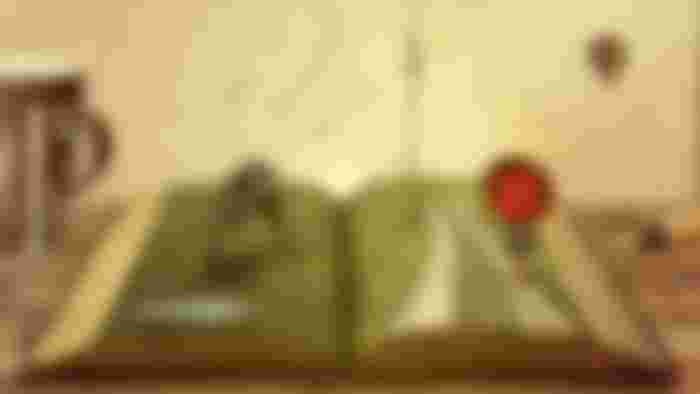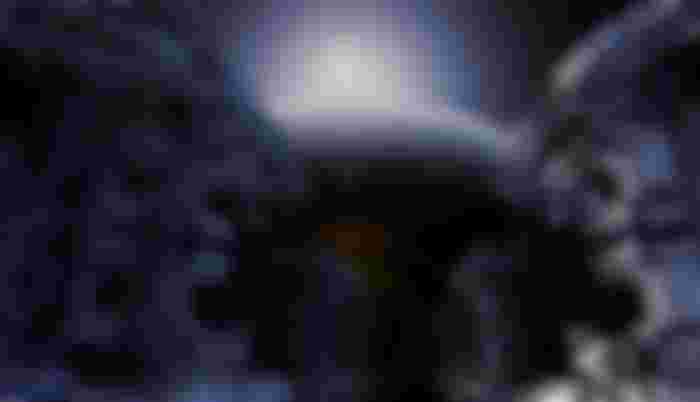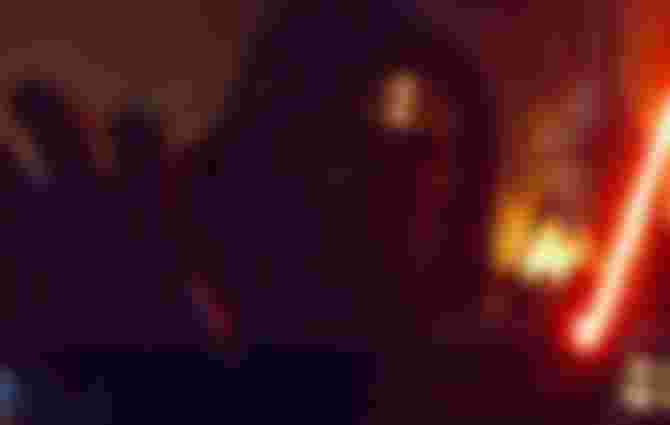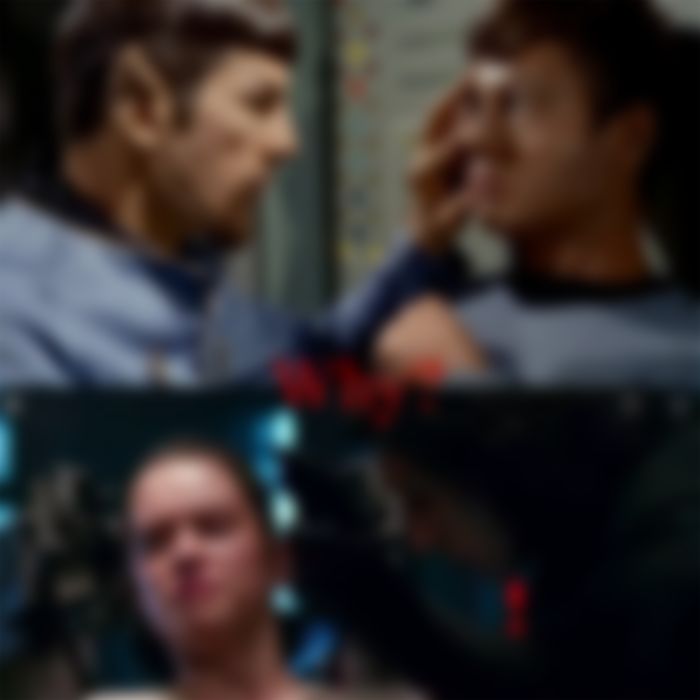
I have a bone to pick with the new Star Wars trilogy. Specifically, it’s an awful trilogy with ardent defenders seeking to slam anyone who disagrees with them as being either a misogynist or someone with internalized misogyny, being unable to appreciate nuance, or being the kind of fans who worship every decision George Lucas ever made. Lots of bad faith arguments abound, and I’m here to lay out exactly why these movies need to be decanonized and forgotten. I’m standing on my soapbox and preaching to the masses about poor fiction today!
This is part 1 of a series I’m writing about poor writing in the sequel trilogy. The topic today: getting your world-building right!
Why World-Building is Important
Writers will usually start with one of three ideas before actually working on plotting their story, fleshing out characters and places, or touching fingertips to keyboard: a character, a place, or an object. If you're Tolkien, you might start with a constructed language, but that still connects deeply to a place and fictional culture.
Regardless, one of the very first things you'll do once you've got your spark to start a story is to build out your world. This is true even of stories that take place in our actual world.
For example, take this passage from Holly Lisle's Create a Culture Clinic:
There was a science fiction story once in which a man was able to disguise the fact that he was an alien by wearing a hat on his head to cover his antennae. All men wore hats almost all the time, so he didn't stand out. The writer assumed that hats were essential to men, and that men would always wear them. And then the culture changed, hats went away, and now the story seems broken.
Novels set in the time of the writer frequently assume culture, and hope the reader will share (or at least comprehend) the culture the writer is assuming. These novels are written for the day and the moment; they'll be unreadable in twenty years. If you want to write for the ages, your writing has to have complete, working subsets of all the cultures you wrote about IN the novel. Every single time. Cultures change. Dickens and Twain are still comprehensible today because they included right in their stories everything you needed to know about how their worlds worked.
This is true even if you aren't writing for adults. Many people who use bad faith arguments to defend Disney's Star Wars sequels will say something along the lines of, "It's a story about space wizards and laser swords meant for children!" as though being a fantastic tale with a broad, even juvenile audience in mind is an excuse to forego any world-building that makes a lick of sense.
We love stories like The Lord of the Rings, Avatar: The Last Airbender, The Wizard of Oz, Star Trek, Alien, Hary Potter, and even the long lines of films spawned from the Disney Renaissance period largely because we love their worlds! We care about the worlds our characters inhabit and we feel like we could survive in them if suddenly plopped down into a place like Middle Earth, Diagon Alley, Oz, or the Earth Kingdom.
Moreover, worlds shape our characters. A lot of people claim that they can overlook poor world-building if the plot and characters are good, but as the foundation of a good plot and characters is the world they inhabit, I find it's one of the harder aspects to overlook.
For example, can you Avatar's Azula and stick her in any other story? No, you can't. You can take her character archetype and shove it into almost any story, but you can't take Azula herself. She's shaped largely by her world: the world at large, the Fire Nation specifically, and the people in her life who are also shaped largely by their world and culture. She's a bender, too, which is a large part of who she is, as our abilities and limitations are also key players in who we become.
Worlds are important!
How Does the Sequel Trilogy Screw it Up?
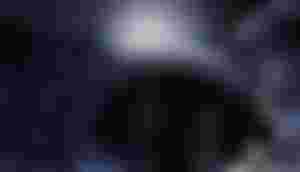
There are a lot of ways that Disney's sequels mess up the world that is Star Wars, but I can't possibly list them all. It's a shame because there's no excuse for this sloppy writing. There has been so much Star Wars media that there's no way anybody who touches the franchise should have such a poor understanding of the fundamentals of this fictional galaxy, yet JJ Abrams and Ryan Johnson repeatedly demonstrate a complete lack of understanding about George Lucas' world.
"That's Not How the Force Works!"
My favorite line from the movie, as I want to scream it almost anytime anyone uses the Force in these movies. There are a lot of places where the Force is misused, but for me the most egregious examples are: characters being able to do things like pause a blaster bolt in midair, play tug-of-war over a spaceship as it's taking off, read minds, freeze human bodies, etc.
The Force, as George Lucas seemed to present it, is similar to Eastern spiritual and supernatural concepts such as chi. It's not the same kind of superpower that you would expect from, say, a Marvel or DC comic; the Force is a spiritual thing that permeates everything, even the inanimate. Some people are sensitive enough to this that they can, through hard work, learn to work with it, manipulating it or cooperating with it.
Here's what we know the Force can do: give you extra agility, allow you to move things with your mind (we'll get into limitations on this later), influence the minds of others, enhance your intuition, give visions, and aid in healing (major limitations!).
Problem 1: Kylo Ren freezes a blaster bolt, can freeze people in place, and later he and Rey play tug-of-war over a spaceship in flight.
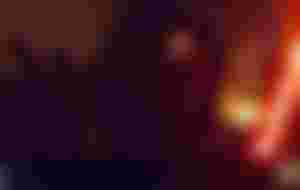
The Force has never been shown to give a wielder power of that magnitude. Yoda was able to lift Luke's spaceship from the swamp it was stuck in, but the ship wasn't moving or even powered on. Vader could intercept blaster bolts, but he couldn't freeze them.
You may be wondering what the big deal is, as these things would seem to converge naturally with telekinetic ability. The problem is that we've not only never seen these things happen before, even in The Clone Wars, and that they have incredible implications when it comes to previous events. In fact, this will be a huge argument of many of these points.
For example, if it's possible for a Jedi or Sith to use the Force to grab onto a spaceship in mid-flight, then why haven't we seen any of them do this? Back when the Jedi were helping the Republic to fight the Separatists, this would've been a fantastic ability to have. Count Dooku wouldn't have gotten away nearly as many times as he had!
If it were possible to freeze someone (apparently Disney is calling this power Force Stasis), then why did Vader go through all the tedious steps to lure Luke to Cloud City and freeze him in carbonite? Couldn't he just do what Kylo did and freeze Luke with the Force, knock him out, and transport him away?
Problem 2: Kylo's Mind-Reading

The Force Awakens establishes that Kylo Ren can read minds. We're not talking manipulation via the Jedi Mind Trick, which is limited by only working on weak, unsuspecting minds, nor are we talking about intuiting information - we're talking about performing a Vulcan Mind-Meld.
A lot of defenders have claimed that this power has been previously utilized, especially in Return of the Jedi, but I disagree. Inferring things by feeling is way different than literally walking through someone's mind and memories, downloading information as you go.
The Force enhances intuition a great deal. In fact, that's usually the way it manifests in untrained Force-sensitives. Luke and Anakin both have heightened intuition and reflexes, for example, and Leia has a particularly strong mind and will.
The first lesson Obi-Wan gives Luke is in intuition, as it's the natural place for a young Padawan to start his/her training. Because of it, Luke is able to deflect the bolts of a training droid while blind and shoot a perfect shot that takes down the Death Star.
We also see that the Force can influence someone's mind, but it's very subtle and easily overcome if someone has a particularly strong mind. This is why, in The Clone Wars, the Jedi are unable to compel Cad Bane to give them information. If only there was a wonderful power that would have allowed them to just steal the information right out of his brain...
So, which moments lead some people to believe that a Force user actively reads minds within George Lucas' original movies?
Some people point to Luke, Leia, Vader, and Obi-Wan Kenobi being able to feel the presence of others. Vader feels Obi-Wan's presence on the Death Star and seeks him out, distracting him from finding Han, Luke, and Chewbacca. Leia feels Luke's presence as Lando and Chewy are preparing to leave Bespin and knows his general location. Likewise, Vader feels Luke's presence on the shuttle in ROTJ and Luke later feels Vader's presence on the Moon of Endor.
This isn't mind-reading, it's intuiting. They can sense a presence within a certain proximity, but they aren't reading that person's mind or exact location, they just have a fairly good hunch about where to find them.
Usually, people will point to Vader being able to learn of Leia's existence, but is this mind-reading or just more intuition? I argue for the latter. Darth Vader doesn't mention reading minds, he says, "Your feelings have now betrayed her, too."
"Feelings" is the keyword here, as they tend to be muddied and imprecise. Feelings don't give away the same kind of information as a thought, which helps the Force users from being so overpowered that they're able to solve any mystery with no work.
George also uses this word a lot in regards to the Force. Obi-Wan urges Luke to trust his feelings, and Luke is also able to use them to learn that Leia is his sister without having to read minds to do so. As Obi-Wan says, "Your feelings do you credit, Luke."
Feeling is how Force-sensitives get their heightened intuition, but it isn't precise. Luke can feel that Vader isn't lying to him about being his father, Leia can feel that Luke survived the Death Star II's explosion, and it's how Vader knows about Leia.
Whereas Kylo is definitely searching through someone's thoughts and memories as though he's simply rifling through a filing cabinet in search of information so precise that he can literally pull a map out of someone's brain, it's never even implied that Vader knows the actual identity of this mysterious daughter of his.
Vader only refers to Leia as "sister", and Robot Chicken backs me up on this one:
Prior to Kylo Ren performing a Vulcan Mind-Meld, and that's exactly what it is, no one thought that Vader was reading Luke's mind. All JJ Abrams did was take a Vulcan ability from Star Trek and shove it into Star Wars without any thought of the implications.
Imagine if Vader had this ability back when he was trying to force Leia to give up the location of the rebel base! Instead of using crude technology to try and squeeze out information, I imagine it would've gone like this:
Vader begins to pry into Leia's mind and picks up a few inconsequential memories.
Leia, being a powerful Force-sensitive herself, is able to block him.
Vader realizes how strong Leia is with the Force and becomes more personally interested in her as a potential apprentice or as a greater threat than he thought.
Leia downloads Vader's memories and training. She is now all-powerful.
I'm not going to go easy on this because The Mandalorian also showed mind-reading. It was bad when TFA introduced it and it was bad when Ahsoka did it.
Problem 3: The Force Doesn't Fold Space or Skype

Ryan Johnson somehow managed to break the Force even more than JJ did. He introduced the idea of a Force Bond and Fold Space. A Force bond means that two people are bonded enough through the Force that they can basically Skype with each other through it. To give credit where credit is due, at least this is treated as an anomaly, but its explanation will lead me to the next problem.
Fold Space is a much bigger problem. The idea is that you can actually interact with and teleport objects through this Force bond whenever you're Skyping with your Force bestie. This allows Ryan Johnson to forcefully bring two characters who don't have much reason to organically become a recreation of Luke and Vader to make them try and convert the other to their side, ending with what's basically a remake of the throne scene from Return of the Jedi but without any real tension or suspense.
If it allowed Ryan Johnson to forego any meaningful character development, then it later allowed JJ Abrams to shove through plot points without having to stop and think about his characters. Why focus on Kylo's search when he can just use this quirky ability to find out exactly where Rey is and get on with the action?
The explanation for this leads me to my next problem.
Problem 4: You Can't Make Up Dyads to Excuse Your Lazy Writing
I don't think Disney and the current bigwigs at Lucasfilm understand the very nature of the Force. I mean, if they've managed to do all of this and treat Force-sensitives like X-Men, then that should be obvious. But I doubt they understand the very basic essence of the Force if they're doing this.
Disney treats the Force like a balance of good and evil. They insinuate as much in The Last Jedi when Luke describes it to Rey. The Force is presented as being like good and evil, life and death. If there are too many Sith or Jedi, it will simply create special bonds of people to rise up and bring balance back.
This was probably something invented because fans couldn't figure out why the Force was so broken in the sequels. Rey and Kylo aren't overpowered because of bad writing, they're overpowered because the Force created two beings who might possibly put Anakin, who was literally born of the Force, to shame!
The Force is less of a balance between good and evil and is more of a state of harmony and the natural order. Perverting the Force, as the Sith do, creates an imbalance. Even in this unnatural state, the Force doesn't typically release a ton of new midichlorians like antibodies to combat the infection. There is a prophecy that seemed to point to Anakin, but this isn't normal fare for it.
To put it into perspective, I'm going to point to Avatar: The Last Airbender. The opening goes like this:
Leaving out the Avatar himself, this is how balance is presented in Geroge's Star Wars. The Four Nations are at peace with one another, but the Fire Nation upsets the balance when it starts a war of expansion.
This is how the Force works. It's not a balance of good and evil, it's simply a state of harmony that evil interrupts. You don't need a Dyad because the Force isn't seeking to make good and evil balance each other, nor is it acting as an immune system to fight infection.
Problem 5: Specific Force Powers Aren't Hereditary
An edit here because I just remembered something big: Rey using Force Lightning as foreshadowing that she's a Palpatine.
Force powers don't denote lineage, for one thing. All Sith have the ability to use lightning, the only reason Vader doesn't is because of his machine parts. Rey using lightning despite no training with it makes no sense if you understand the Force.
Force powers also aren't born of emotion. The Sith may channel hatred and the Jedi may channel love, but this doesn't mean that the Jedi prance about in a state of love all the time or that the Sith are constantly hating everyone around them. These tend to be general worldviews instead of literal emotions most of the time.
The Force is a magic system that relies more on calmness than emotional outbursts. A huge outburst like Rey gives us during the annoying tug-of-war scene is more likely to completely shut down her power than charge it. This makes the magic system in Star Wars different than most. The Jedi learn to channel the Force through meditation, silently feeling it out instead of just controlling their emotions like the characters of Teen Titans.
Whereas Hagrid asks Harry, "Did you ever make anything happen? Anything you couldn't explain when you were angry or scared?" He asks this because magic within Rowling's Wizarding World can work this way. It can't in Star Wars or young Anakin would be known for a lot more than being the only human who can kind of sort of podrace.
Problem 6: Force Healing Ruins Everything
Finally, and I can't believe I forgot this yesterday, Force healing sucks! Remember when Anakin was desperate to find a way to save Padme? Wouldn't it have been nice if the Jedi knew a way to heal mortal wounds?
Within the EU, Force healing was a small power. You could speed up the healing process, but you couldn't undo wounds or disease. This makes sense, as anything else would likely be considered unnatural by the Jedi.
Palpatine promises that the Sith can do it, or at least learn to do it, which is how Anakin falls to the dark side to begin with. To say the secret was hidden away in Jedi Texts but forgotten about because of the dull reading experience is to insult the prequels and the fanbase.
The only evidence of this ability existing at all is when, as it's theorized, Palpatine stole the life force from Padme to keep Anakin alive. He didn't cure Anakin of his injuries, but he managed to help him survive his transformation into the Darth Vader we all know. It's unnatural, it's evil, and it's everything the Jedi would never do.
Rey and Ben being able to both do this is wrong in many, many ways. Is it possible to take injuries seriously with Rey around? Does this undo Anakin's arc?
Conclusion
This franchise has developed a world-building problem. There are more world-building issues coming in Part 2, but I decided to focus on the Force this time around, as it's the very foundation of the world.
Let me know what you think! Am I off my rocker?
